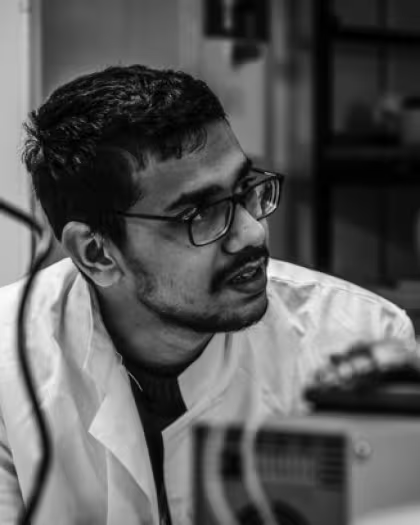Research groups
- Geochemistry and Geobiology
- Centre for Early Sapiens Behaviour (SapienCE)
- Centre for Deep Sea Research
Short info
My research also involves working with organic geochemical biomarkers to better understand early homo sapiens evolution
Research
My research aims at understanding fluid-microbe interactions. I'm interested in the formation of organic molecules as a result of pyrolysis of microbial biomass (Archaeal and Bacterial) under various hydrothermal conditions using the Dickson-type flexible-cell high temperature-pressure reactors.
My work also includes understanding the formation and interactions of various organic compounds and nutrients in natural hydrothermal systems and their role on microbial metabolism.
I am also interested in understanding the effects of fluid-rock interactions, magma degassing, sub-surface cooling and mixing of seawater on hydrothermal fluids using fluid geochemistry and thermodynamic modelling. I'm based at the Department of Earth Sciences and the Centre for Deep Sea Research .
Expeditions:
2012 GS22 ► R/V GO Sars/ROV Ægir ►Arctic Mid-Oceanic ridge
2021 HACON21 ► R/V Kronprins Haakon/ROV Aurora(REV Ocean) ►Gakkel Ridge: Aurora vent field
2019 GS19 ► R/V GO Sars/ROV Ægir ►Arctic Mid-Oceanic ridge: 73°N Vent Site
2019 PS119 ► R/V Polarstern/ROV Quest 4000m ► East Scotia ridge and South Sandwich island arc
2018 M149 ► R/V Meteor/MeBo-70 ► Gulf of Cadiz
Curriculum Vitae
- 08/2020-2023: PhD Research Fellow, University of Bergen.
- 10/2017-01/2020: MSc Marine Geosciences, University of Bremen, Germany. Thesis: Geochemical investigations of hydrothermal fluids from the South Sandiwch island arc, Southern Ocean.
- 07/2014-07/2017: BSc Geology, St Xavier's College, University of Mumbai, India.
Outreach
- 2021
Expedition HACON21 blog
Article in Aftenposten (The search for the origin of life) about NFR project HyPOD.
- 2020
Expedition PS119 (Into the Deep) blog post in Google Arts and Culture
Publications
Academic article
- Lapointe, Charles; Jamieson, John W.; Reeves, Eoghan et al. (2025). The ice-covered Aurora hydrothermal vent field, Gakkel Ridge, Arctic Ocean: ultramafic-influenced venting at a mafic axial volcano on Earth’s slowest spreading center. (external link)
- Pereira, Samuel; Emilsson, Bo; Reeves, Eoghan (2025). Trace analysis of volatile fatty acids in marine waters using modern high-pressure ion chromatography. (external link)
- Pereira, Samuel; Diehl, Alexander; McDermott, Jill M et al. (2022). Geochemistry of Hydrothermal Fluids From the E2-Segment of the East Scotia Ridge: Magmatic Input, Reaction Zone Processes, Fluid Mixing Regimes and Bioenergetic Landscapes. (external link)
- Kurzinger, Victoria; Bach, Wolfgang; Diehl, Alexander et al. (2022). Sulfur formation associated with coexisting sulfide minerals in the Kemp Caldera hydrothermal system, Scotia Sea. (external link)
- Ramirez-Llodra, Eva; Argentino, Claudio; Baker, Maria et al. (2022). Hot Vents Beneath an Icy Ocean: The Aurora Vent Field, Gakkel Ridge, Revealed. (external link)
See a complete overview of publications in Cristin.
PEER-REVIEWED PUBLICATIONS
[4] Pereira, S.I., B. Emilsson, E.P. Reeves (2025) Trace analysis of volatile fatty acids in marine waters using modern high‐pressure ion chromatography. Limnology and Oceanography: Methods. DOI: 10.1002/lom3.10686
[3] Ramirez-Llodra, E., C. Argentino, M. Baker, A. Boetius, C. Costa, H. Dahle, E.M. Denny, P.-A. Dessandier, M.H. Eilertsen, B. Ferre, C.R. German, K. Hand, A. Hilário, L. Hislop, J.W. Jamieson, D. Kalnitchenko, A. Mall, G. Panieri, A. Purser, S.P. Ramalho, E.P. Reeves, L. Rolley, S.I. Pereira, P.A. Ribeiro, M.F. Sert, I.H. Steen, M. Stetzler, R. Stokke, L. Victorero, F. Vulcano, S. Vågenes, K.A. Waghorn, S. Buenz (2023) Hot vents beneath an icy ocean: The Aurora Vent Field, Gakkel Ridge, revealed. Oceanography, 36. DOI: 10.5670/oceanog.2023.103
[2] Kürzinger, V., Bach, W., Diehl, A., Pereira, S.I., Strauss, H. and Bohrmann, G., (2022). Sulfur formation associated with coexisting sulfide minerals in the Kemp Caldera hydrothermal system, Scotia Sea. Chemical Geology, p.120927. DOI: 10.1016/j.chemgeo.2022.120927
[1] Pereira, S.I., Diehl, A., McDermott, J.M., Pape, T., Klose, L., Strauss, H., Bohrmann, G. and Bach, W (2022). Geochemistry of hydrothermal fluids from the E2-segment of the East Scotia Ridge: Magmatic input, reaction zone processes, fluid mixing regimes and bioenergetic landscapes. Frontiers in Marine Science. DOI:https://doi.org/10.3389/fmars.2022.765648
Projects
#Past *Present
HACON (FRINATEK)#
E.Ramirez (PI/NIVA-REV OCEAN)
HyPOD (FRINATEK)#
E.P. Reeves (PI/UiB), I.H. Steen (UiB), F. Schubotz (Uni. Bremen), T.Dittmar (ICBM/MPI)
Sandwich Venting II (BMBF/ DFG)#
G. Bohrmann (Uni Bremen), W. Bach (Uni Bremen), A. Diehl (Uni Bremen)


